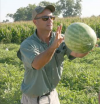People
 Juang Chong: Juang Horng “JC” Chong is an Associate Professor and Extension Specialist in the Department of Plant and Environmental Sciences at Clemson University. JC holds degrees in Ecology and Evolutionary Biology from the University of Arizona (BS), and Entomology from the University of Georgia (MS and PhD). JC worked on classical biological control programs against pink hibiscus mealybug, Asian citrus psyllid, lobate lac scale, tropical soda apple, among others, as a post-doctoral fellow under a joint project between USDA-APHIS and the University of Florida.
Juang Chong: Juang Horng “JC” Chong is an Associate Professor and Extension Specialist in the Department of Plant and Environmental Sciences at Clemson University. JC holds degrees in Ecology and Evolutionary Biology from the University of Arizona (BS), and Entomology from the University of Georgia (MS and PhD). JC worked on classical biological control programs against pink hibiscus mealybug, Asian citrus psyllid, lobate lac scale, tropical soda apple, among others, as a post-doctoral fellow under a joint project between USDA-APHIS and the University of Florida.
JC’s program focuses on studying the ecology and developing IPM programs in specialty crops, with primary focus on turf and ornamental plant systems. Three major pests—whiteflies, thrips and twospotted spider mites—are ubiquitous species across multiple cropping systems. JC’s program is at the forefront of evaluating new and reduced-risk chemistries against these major pests, as well as evaluating the compatibility of new and existing chemistries against biological control agents. Other recent projects include documenting the diversity, biology and natural enemies of scale insects, understanding the diversity and management of wood boring insects, and conserving pollinators in ornamental plant systems through a better understanding of pollinator attractiveness of ornamental plants, residual dynamic of systemic insecticides and development of best management practices.
Carmen Blubaugh is an Assistant Professor in Clemson University's Plant and Environmental Sciences  Department. She examines interactions between agricultural biodiversity and biological control of crop pests through many lenses. Her work includes weed ecology and predator-prey interactions, soil microbes and plant/herbivore interactions, as well as predator diversity and herbivore control. Using observational and experimental approaches in the field, lab and greenhouse, she's learning to identify management strategies that both promote pest control and reduce the environmental impact of agriculture. At Clemson, she teaches Integrated Pest Management and Insect Ecology courses. On this project, Carmen will lead to on-farm surveys of pest and predator communities on squash and tomato crops in collaboration with farmers in Georgia, South Carolina, and North Carolina.
Department. She examines interactions between agricultural biodiversity and biological control of crop pests through many lenses. Her work includes weed ecology and predator-prey interactions, soil microbes and plant/herbivore interactions, as well as predator diversity and herbivore control. Using observational and experimental approaches in the field, lab and greenhouse, she's learning to identify management strategies that both promote pest control and reduce the environmental impact of agriculture. At Clemson, she teaches Integrated Pest Management and Insect Ecology courses. On this project, Carmen will lead to on-farm surveys of pest and predator communities on squash and tomato crops in collaboration with farmers in Georgia, South Carolina, and North Carolina.
 Rebecca Schmidt-Jeffris, Clemson University: Dr. Rebecca Schmidt-Jeffris is an assistant professor at Clemson University, where she serves as the vegetable and strawberry specialist for South Carolina. Her research program focuses on biological control, mite management, landscape ecology, and soil health impacts on arthropods. Current projects in her lab include miticide resistance and non-target effects on natural enemies in strawberries, impacts of organic weed management practices on natural enemies, predatory mite biodiversity in vegetables, and impacts of cover crops on host-plant selection. Her extension program includes county and regional grower meetings, conservation biocontrol trainings with the Natural Resources Conservation Service, and publication of production guides, including the myIPM app and the Southeastern Vegetable Crop Handbook. She also leads the SEVBiocon Working Group, which focuses on improving research and extension activities in biological control in southeast vegetables.
Rebecca Schmidt-Jeffris, Clemson University: Dr. Rebecca Schmidt-Jeffris is an assistant professor at Clemson University, where she serves as the vegetable and strawberry specialist for South Carolina. Her research program focuses on biological control, mite management, landscape ecology, and soil health impacts on arthropods. Current projects in her lab include miticide resistance and non-target effects on natural enemies in strawberries, impacts of organic weed management practices on natural enemies, predatory mite biodiversity in vegetables, and impacts of cover crops on host-plant selection. Her extension program includes county and regional grower meetings, conservation biocontrol trainings with the Natural Resources Conservation Service, and publication of production guides, including the myIPM app and the Southeastern Vegetable Crop Handbook. She also leads the SEVBiocon Working Group, which focuses on improving research and extension activities in biological control in southeast vegetables.
 Jim Walgenbach, North Carolina State University: Jim Walgenbach is a professor of entomology in the Department of Entomology and Plant Pathology at NC State University. He is located at the Mountain Horticultural Crops Research & Extension Center, located in the Southern Appalachian Mountains in Mills River, NC, where he conducts an applied research and extension program in the area of integrated pest management on tree fruits and vegetables. In recent years his research program has focused on the biology and management of brown mamorated stink bug (BMSB), twospotted spider mite, and oriental fruit moth (OFM). This work includes enhancing biological control of spider mites in tomato systems with Phytoseiulus persimilis, and quantifying the role of native natural enemies on population regulation of BMSB in non-managed habitats. Research has also been conducted to assess the impact of pesticides on biological control agents, improved pheromone-based monitoring programs for stink bugs and OFM, use of drip chemigation as a reduced-risk alternative to foliar insecticide applications in vegetable crops. He works closely with extension personnel, growers and the crop protection industry to develop and implement sustainable pest management programs.
Jim Walgenbach, North Carolina State University: Jim Walgenbach is a professor of entomology in the Department of Entomology and Plant Pathology at NC State University. He is located at the Mountain Horticultural Crops Research & Extension Center, located in the Southern Appalachian Mountains in Mills River, NC, where he conducts an applied research and extension program in the area of integrated pest management on tree fruits and vegetables. In recent years his research program has focused on the biology and management of brown mamorated stink bug (BMSB), twospotted spider mite, and oriental fruit moth (OFM). This work includes enhancing biological control of spider mites in tomato systems with Phytoseiulus persimilis, and quantifying the role of native natural enemies on population regulation of BMSB in non-managed habitats. Research has also been conducted to assess the impact of pesticides on biological control agents, improved pheromone-based monitoring programs for stink bugs and OFM, use of drip chemigation as a reduced-risk alternative to foliar insecticide applications in vegetable crops. He works closely with extension personnel, growers and the crop protection industry to develop and implement sustainable pest management programs.

 Babu Srinivasan, University of Georgia: Dr. Rajagopalbabu Srinivasan is an Associate Professor in the Department of Entomology at the University of Georgia. He is also an Adjunct Associate Professor in the Department of Plant Pathology. He conducts basic and applied research on important thrips, whitefly, and aphid- transmitted plant viruses affecting several row and vegetable crops in Georgia and in Southeastern United States. His lab is currently involved in studying the process of virus transmission by vectors, component (vector-virus-host plant) interactions, and the various factors that mediate these interactions. His lab is also focused on sustainable management of insect-transmitted viruses and vectors in both conventional and organic production systems. His research program is aimed at evaluating host plant resistance as the primary management option, and attempts to integrate host resistance with various cultural and biological control options. Dr. Srinivasan is a member of the Entomological Society of America as well as the American Phytopathological Society, and he has authored and/or co-authored 49 peer-reviewed publications and 7 book chapters. He has also served as a PI and/or Co-PI on grant projects totaling over $7 million from federal, regional, state, and industry funding sources since 2009. Dr. Srinivasan is an associate editor for two entomology journals, and has been a member of several national and international grant reviewing committees. He, along with postdoctoral associates and graduate students in his laboratory, regularly present their research in numerous international, national, and regional conferences and symposia.
Babu Srinivasan, University of Georgia: Dr. Rajagopalbabu Srinivasan is an Associate Professor in the Department of Entomology at the University of Georgia. He is also an Adjunct Associate Professor in the Department of Plant Pathology. He conducts basic and applied research on important thrips, whitefly, and aphid- transmitted plant viruses affecting several row and vegetable crops in Georgia and in Southeastern United States. His lab is currently involved in studying the process of virus transmission by vectors, component (vector-virus-host plant) interactions, and the various factors that mediate these interactions. His lab is also focused on sustainable management of insect-transmitted viruses and vectors in both conventional and organic production systems. His research program is aimed at evaluating host plant resistance as the primary management option, and attempts to integrate host resistance with various cultural and biological control options. Dr. Srinivasan is a member of the Entomological Society of America as well as the American Phytopathological Society, and he has authored and/or co-authored 49 peer-reviewed publications and 7 book chapters. He has also served as a PI and/or Co-PI on grant projects totaling over $7 million from federal, regional, state, and industry funding sources since 2009. Dr. Srinivasan is an associate editor for two entomology journals, and has been a member of several national and international grant reviewing committees. He, along with postdoctoral associates and graduate students in his laboratory, regularly present their research in numerous international, national, and regional conferences and symposia.
David Lamie, Clemson University
 Bhabesh Dutta, University of Georgia: Dr. Dutta’s extension program focuses on the management of the multitude of plant diseases that affect over 30 different vegetable crops (organic and conventional) produced in Georgia. Dr. Dutta’s research efforts focus on Fusarium wilt of watermelon, cucurbit and tomato viral diseases, gummy stem blight of watermelon, bacterial spot of pepper, black rot of cabbage, and a complex of bacterial diseases of onion. Research efforts include monitoring strains for fungicide resistance and gaining a better understanding on the ecology of pathogens. This information will be used to develop novel management practices ranging from the use of nanotechnology-formulated pesticides to how best fertilize plants with micronutrients that up-regulate superoxide dismutases and other enzymes associated with the systemic acquired resistance pathway in plants.
Bhabesh Dutta, University of Georgia: Dr. Dutta’s extension program focuses on the management of the multitude of plant diseases that affect over 30 different vegetable crops (organic and conventional) produced in Georgia. Dr. Dutta’s research efforts focus on Fusarium wilt of watermelon, cucurbit and tomato viral diseases, gummy stem blight of watermelon, bacterial spot of pepper, black rot of cabbage, and a complex of bacterial diseases of onion. Research efforts include monitoring strains for fungicide resistance and gaining a better understanding on the ecology of pathogens. This information will be used to develop novel management practices ranging from the use of nanotechnology-formulated pesticides to how best fertilize plants with micronutrients that up-regulate superoxide dismutases and other enzymes associated with the systemic acquired resistance pathway in plants.
 Timothy Coolong, University of Georgia: For the past 11.5 years Dr. Coolong has worked as an extension vegetable specialist. For the past 5 years he has worked with growers across the state of GA, focusing on larger commercial farms in SW GA. He has focused primarily on variety evaluation as well as improving irrigation and fertilizer recommendations for vegetable crops in GA. In 2018 he moved his program to main campus focusing on extension, teaching, and research, for organic vegetable production in the region.
Timothy Coolong, University of Georgia: For the past 11.5 years Dr. Coolong has worked as an extension vegetable specialist. For the past 5 years he has worked with growers across the state of GA, focusing on larger commercial farms in SW GA. He has focused primarily on variety evaluation as well as improving irrigation and fertilizer recommendations for vegetable crops in GA. In 2018 he moved his program to main campus focusing on extension, teaching, and research, for organic vegetable production in the region.
 Alice Formiga, Oregon State University/eOrganic: Alice Formiga is an Assistant Professor of Practice at the Oregon State University Department of Horticulture and she is the Executive Director of eOrganic. Since 2009, she has worked with eOrganic to publish articles, videos and webinars on organic farming research and practice to expand the reach of federally funded research projects and make the findings publicly available.
Alice Formiga, Oregon State University/eOrganic: Alice Formiga is an Assistant Professor of Practice at the Oregon State University Department of Horticulture and she is the Executive Director of eOrganic. Since 2009, she has worked with eOrganic to publish articles, videos and webinars on organic farming research and practice to expand the reach of federally funded research projects and make the findings publicly available.
Funding

This project was funded by the Organic Research and Extension Initiative (OREI), part of the USDA National Institute of Food and Agriculture, grant number 2018-51300-28425
